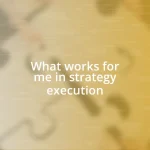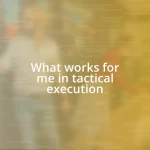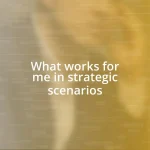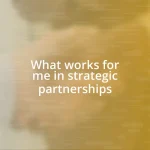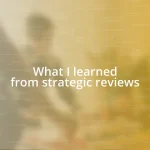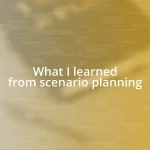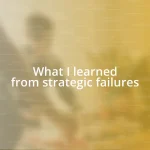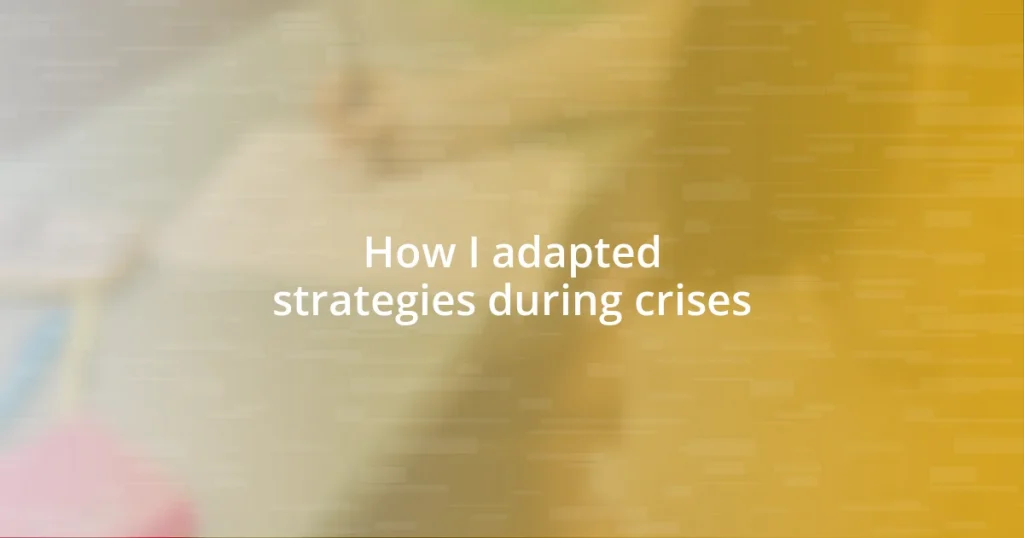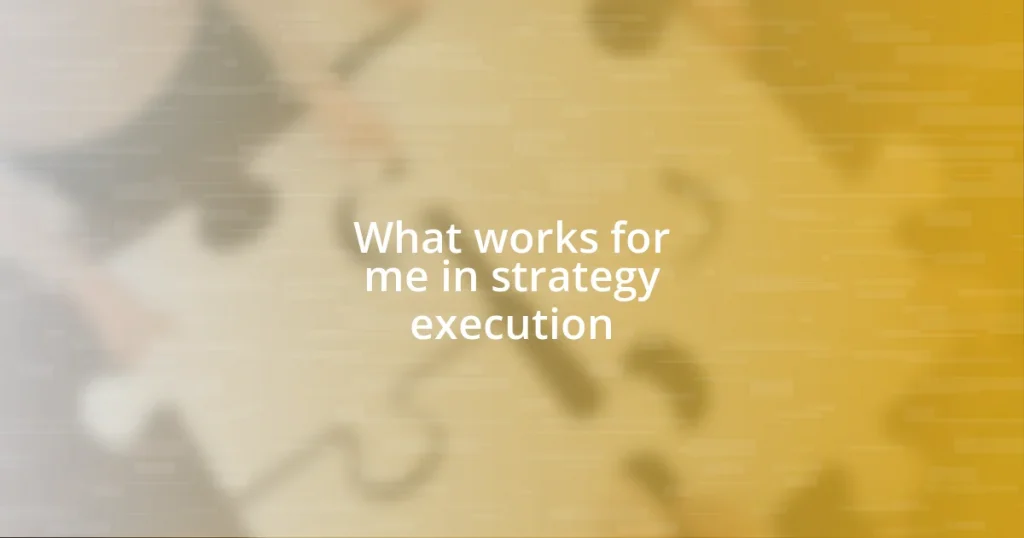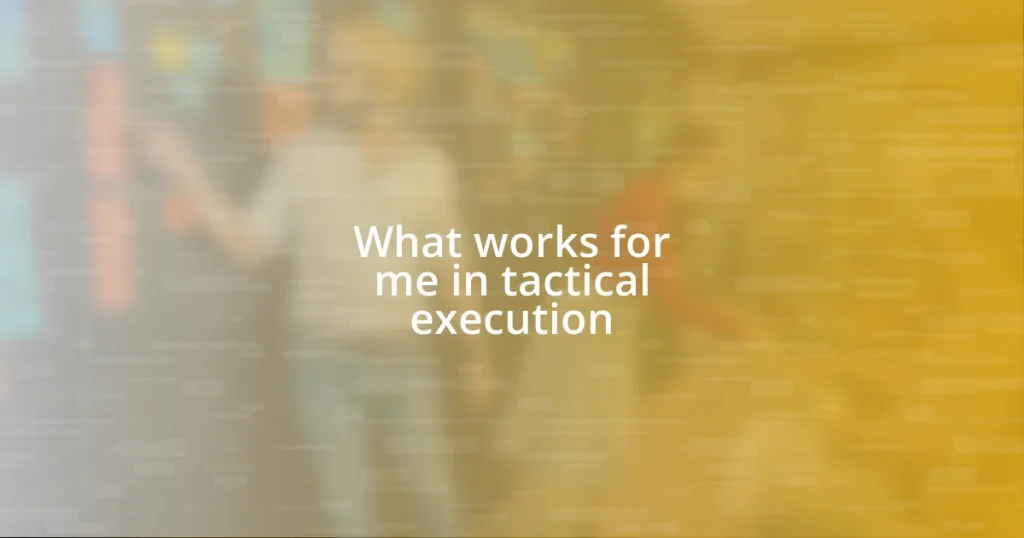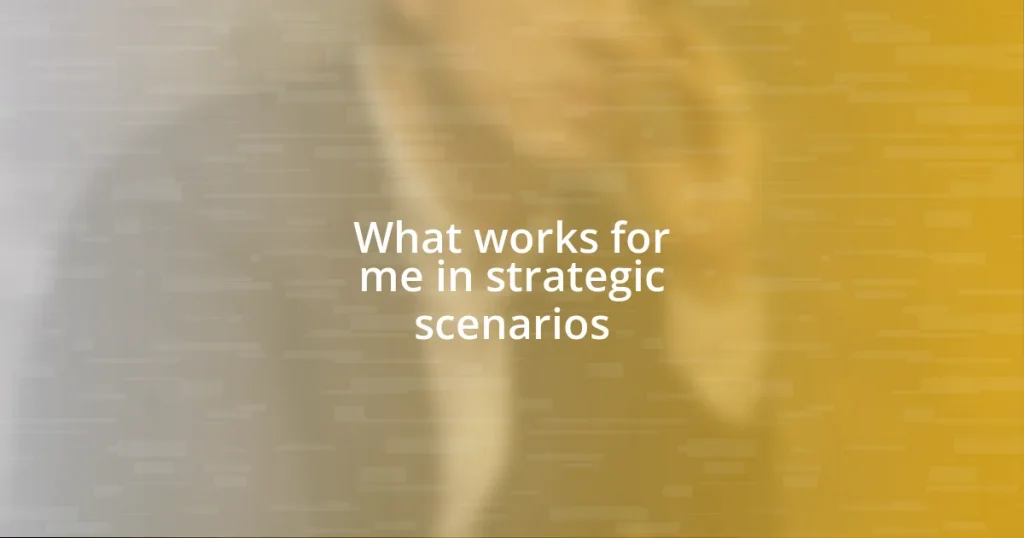Key takeaways:
- Crises reveal vulnerabilities and strengths; understanding their ripple effects fosters resilience within individuals and communities.
- Developing a crisis response plan involves risk assessment, team collaboration, and plan testing to ensure adaptability during disruptions.
- Building resilience requires proactive support networks, setting small goals for manageable progress, and embracing a mindset of curiosity to learn from setbacks.

Understanding crises and their impact
Crises often strike when we least expect them, shaking the very foundations of our daily lives. I still remember the moment when I first faced an unexpected financial setback; the anxiety was palpable, almost suffocating. How do we recover from such sudden disruptions, and what does it really tell us about our resilience?
The emotional toll of a crisis can be overwhelming, leaving us grappling with fear and uncertainty about the future. For me, navigating through that challenging period required recognizing my feelings and understanding that it was okay to seek help. Have you ever felt isolated during a tough time, wondering if anyone else really understands what you’re going through?
Understanding a crisis means comprehending its ripple effects—not just on us, but on our loved ones, our communities, and even the larger world. Once, while volunteering during a community recovery effort, I saw firsthand how interconnected we all are; one person’s struggle can quickly become a community’s challenge. Isn’t it fascinating how crises reveal our vulnerabilities but also our collective strength?

Developing a crisis response plan
Developing a crisis response plan requires a proactive approach. When I first crafted my own plan, I found it helpful to thoroughly assess potential risks. Each risk had its own nuances, and by identifying them, I could address specific concerns more effectively. Have you ever noticed that preparation often alleviates some of the fear associated with uncertainty?
Part of my strategy involved assembling a reliable team of individuals who could support one another during a crisis. This collaboration brought an empowering sense of unity, reminding me of a time when my colleagues banded together during a sudden operational disruption at work. Seeing others step up sparked an inspiring motivation in all of us. I’ve learned that having diverse perspectives in a team maximizes problem-solving capabilities.
Testing the plan is another critical step that shouldn’t be overlooked. I remember the first simulation I ran; it was both eye-opening and slightly nerve-wracking. We encountered unexpected challenges, and it became clear that adjustments were necessary. This practice solidified my belief that flexibility and adaptability are key. After all, it’s not just about having a plan; it’s about ensuring that plan evolves with each crisis we face.
| Key Element | Description |
|---|---|
| Risk Assessment | Identify potential risks and their impact. |
| Team Collaboration | Build a support network to enhance response efforts. |
| Plan Testing | Simulate crises to identify weaknesses and adapt the plan. |

Identifying key strategies for adaptation
Identifying strategies for adaptation is all about recognizing what works best in the moment. For instance, during a particularly tough time in my life, I turned to journaling as a way to process my emotions. Writing down my thoughts not only helped me gain clarity but also served as a reminder that I was not alone in feeling overwhelmed. Have you ever tried putting your feelings on paper? It can be incredibly empowering.
Here are several key strategies that I’ve found invaluable:
- Mindfulness Practice: Staying present helps mitigate anxiety and fosters a clearer perspective.
- Resource Allocation: Prioritizing essential resources ensures that I focus on what truly matters.
- Community Engagement: Connecting with others who share similar challenges can offer fresh insights and support.
- Continuous Learning: Adaptation also means being open to new ideas and strategies that can improve resilience.
- Setting Small Goals: Breaking down larger tasks into smaller, manageable steps alleviates pressure and motivates progress.
I’ve learned that by employing these strategies, I create a firmer foundation to build upon during turbulent times. Life may throw curveballs at us, but with the right mindset, we can navigate our way through.

Leveraging communication during crises
Effective communication can serve as a lifeline during crises. I remember a particularly chaotic moment when my team faced a sudden shift in project expectations. Keeping everyone in the loop through regular updates not only alleviated anxiety but also fostered a sense of camaraderie. Have you ever felt the power of information to calm a storm? I certainly have, and it played a pivotal role in our navigating that turbulent period.
During a crisis, transparency becomes crucial. Sharing both the successes and challenges creates an atmosphere of trust. I once led a meeting where I laid out our setbacks honestly, and instead of panic, we found a shared resolve. This openness encouraged my colleagues to contribute their solutions, making us feel more like a cohesive unit, rather than individuals dealing with personal worries.
Moreover, adapting communication styles to fit the needs of my team has proven essential. Some team members appreciate direct, concise updates, while others thrive on more detailed discussions. I learned this distinction firsthand when my usual approach to communicate shifted in a challenging financial quarter. By tailoring my message, I empowered everyone to engage meaningfully, which transformed our ability to tackle issues head-on together. Isn’t it fascinating how a simple shift in communication can ignite a team’s potential?

Implementing flexible decision-making processes
Flexible decision-making processes are crucial, especially when faced with crises. I remember a time when my plans fell apart overnight due to an unexpected circumstance. Instead of adhering to a rigid strategy, I gathered my team and encouraged open discussion. This collaborative approach enabled us to adapt quickly by weighing varying perspectives, which often led to creative solutions we hadn’t previously considered. Isn’t it amazing how the collective intelligence of a group can redefine a path when you least expect it?
When I think about flexibility in decision-making, I reflect on my own experience with ambiguity. There was a point when an important project hit a snag because of external factors. Rather than sticking to the original timeline, I decided to embrace an iterative approach. This meant making decisions on the fly, constantly checking in with my team, and modifying our course as new information emerged. It felt a bit chaotic at first, but that adaptability kept the momentum going and inspired everyone to contribute equally. Have you encountered a similar situation where being adaptable opened new doors?
Additionally, I’ve learned to cultivate a mindset of acceptance regarding uncertainty. When faced with demanding choices, I often remind myself that not every decision will be perfect. I recall a particularly stressful quarter where available data was late to arrive. Rather than waiting in limbo, I opted to make a choice based on the best insights we had at the moment, trusting our ability to pivot later if necessary. This experience taught me that flexibility doesn’t just ease stress; it also fuels growth and learning. How about you? Have you ever found clarity through the ability to embrace change?

Evaluating outcomes and learning
Reflecting on the outcomes of our crisis strategies has been enlightening. One memorable instance was when we adjusted our project scope mid-course after realizing we were off target. I vividly remember the moment we gathered to analyze our progress and outcomes. The discussion felt charged with energy and, surprisingly, optimism. Asking questions like “What went well?” and “What can we improve?” helped us not only capture valuable insights but also fostered a culture of continuous learning. Have you taken the time to evaluate your past experiences in this way?
I’ve come to realize that evaluating outcomes isn’t just about measuring success; it’s about understanding the lessons learned. Following a particularly stressful project launch that didn’t meet our expectations, I took it upon myself to conduct a thorough debrief with my team. We dissected each phase, discussing what led to our missteps and identifying actionable steps for future projects. The process was cathartic, fostering a sense of accountability and growth. Have you ever experienced that ‘aha’ moment where reflection leads to a breakthrough?
Ultimately, I learned that the key to successful evaluation lies in the willingness to embrace vulnerability. During a post-crisis assessment, I shared my own misjudgments, opening the door for my team to do the same. The atmosphere shifted; instead of fear of blame, we nurtured a shared commitment to growth. This candidness made our evaluations richer and more impactful. What can your own experiences teach you about the importance of vulnerability in learning from outcomes?

Building resilience for future challenges
Building resilience for future challenges requires a proactive mindset. In my experience, one of the most powerful tools has been the establishment of a support network. When I faced significant challenges in my career, I reached out to mentors and peers. Their encouragement and insights helped me regain perspective and tackle issues more effectively. Have you ever relied on someone else’s experience to help you navigate a storm?
Another lesson I’ve learned is the importance of setting small, achievable goals. During a particularly tumultuous project, I felt overwhelmed by the enormity of what lay ahead. To combat this, I broke tasks into bite-sized pieces, celebrating each small victory along the way. This approach not only lightened the emotional burden but also enhanced my focus and motivation. Can you think of a time when tackling a large task in small steps led to your success?
Lastly, adopting a mindset of curiosity and learning has been vital for resilience. There have been moments when I made mistakes, realizing the hard way that I hadn’t fully understood a situation. Instead of wallowing in regret, I chose to investigate what went wrong, asking questions to dig deeper. This process transformed my perspective from seeing setbacks as failures to viewing them as invaluable learning experiences. What about you—how have your own missteps enriched your understanding and prepared you for future challenges?
